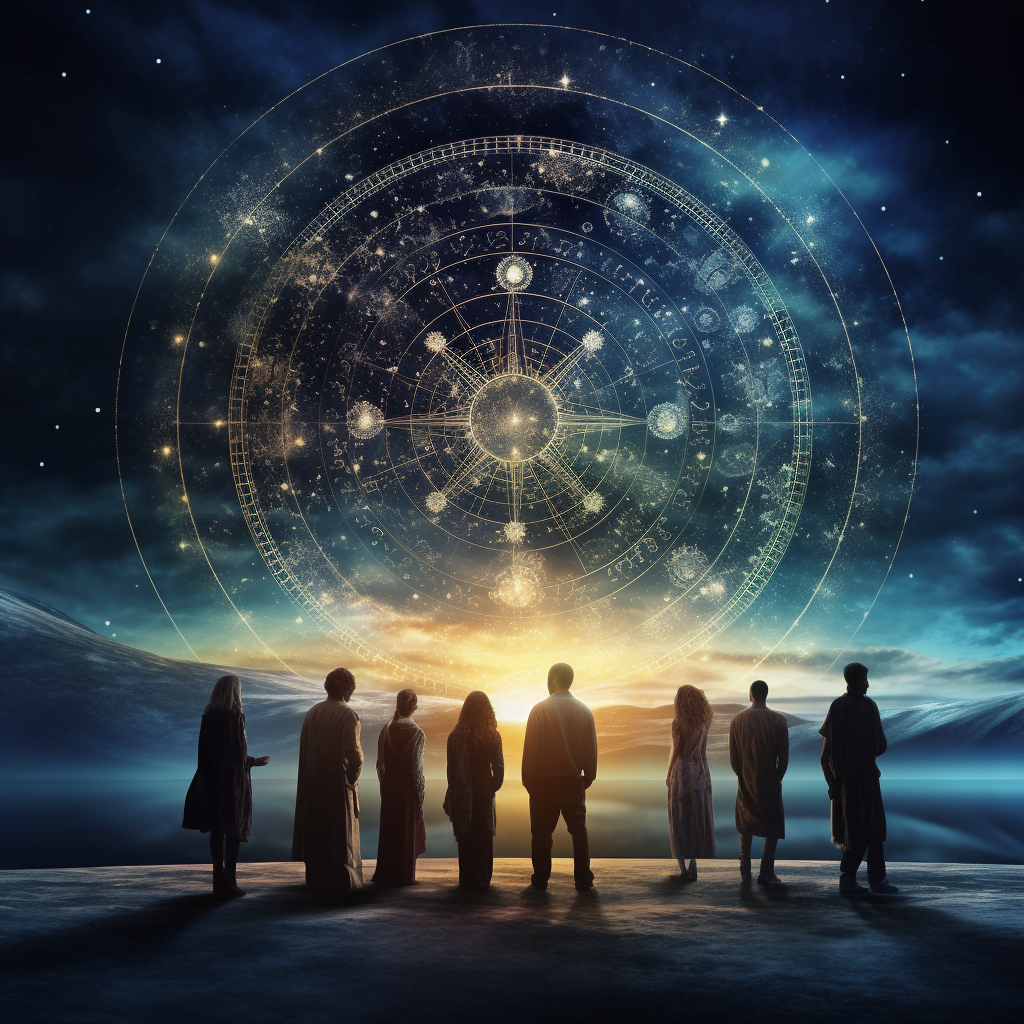Throughout history, astrology has captivated humanity’s curiosity, offering personal insights and cosmic guidance. This article explores the fascinating origins and evolution of astrology, delving into its ancient beginnings and tracing its development over millennia. From the ancient Mesopotamians’ celestial observations to the intricate system of the zodiac, astrology has played a profound role in shaping cultures and civilizations across the globe. By examining the historical context and cultural significance of astrology, we can gain a deeper understanding of how this age-old practice has endured and continues to resonate with people today.
The Origins of Astrology
Astrology, an ancient practice that examines the correlation between celestial movements and human affairs, has a rich and mysterious history. The origins of astrology can be traced back thousands of years, where its early practices began to take shape in various ancient civilizations. Understanding the beginnings and development of this complex and influential discipline allows us to appreciate its enduring relevance in modern society.
Mysterious Beginnings
The precise origins of astrology remain shrouded in mystery, lost in the depths of time. However, archaeological evidence suggests that its roots can be traced back to at least the 2nd millennium BCE. Ancient cultures looked to the heavens and recognized patterns in celestial movements, leading them to believe that there was a connection between the stars and earthly events. This belief formed the foundation upon which astrology would later evolve.
Early Astrological Practices
The earliest astrological practices were centered around observation and interpretation of celestial phenomena. Early civilizations, such as the Babylonians, Egyptians, and Chinese, developed intricate systems to study the movements and positions of the stars, planets, and other celestial bodies. Astrologers meticulously recorded their observations and gradually identified patterns that they believed had significance in predicting events and influencing human behavior.
Astrology in Ancient Civilizations
Astrology played a prominent role in many ancient civilizations, influencing religion, governance, and daily life. In Mesopotamia, the birthplace of astrology, civilizations such as the Sumerians, Babylonians, and Assyrians, developed their own unique astrological systems. Similarly, in ancient Egypt, astrology was deeply intertwined with religious beliefs, with the pharaohs themselves being seen as divine beings connected to the celestial realm. In Greece and India, astrology formed an integral part of philosophical and cultural traditions, leaving a lasting impact on their societies.
Astrology in Ancient Mesopotamia
Sumerian Astrology
The Sumerians, an ancient civilization of Mesopotamia, are credited with laying the foundation for astrology as we know it today. They developed a system known as “celestial omens” or “celestial divination,” which involved interpreting celestial events as signs of divine will. The Sumerians believed that these omens could provide insight into the future and guide decision-making in various aspects of life, including agriculture, politics, and warfare.
Babylonian Astrology
Building upon the Sumerian system, the Babylonians further refined astrology by developing a sophisticated method of interpreting celestial phenomena. They constructed intricate celestial maps, known as horoscopes, which depicted the positions of planets and stars at the time of an individual’s birth. Babylonian astrologers believed that these horoscopes could reveal detailed information about a person’s character, destiny, and potential future events.
Assyrian Astrology
The Assyrians, influenced by the Babylonians, also embraced astrology and incorporated it into their culture and governance. Assyrian kings consulted astrologers to assist them in making decisions, such as when to wage war or embark on important projects. Astrology became an integral part of the Assyrian empire, with astrologers serving as trusted advisors and guiding the destiny of the kingdom.
Astrology in Ancient Egypt
Astrology and Religious Beliefs
In ancient Egypt, astrology played a significant role in religious beliefs and practices. The Egyptians worshiped a pantheon of gods and believed that these deities governed different aspects of the universe, including the movements of celestial bodies. Astrologers in Egypt interpreted the positions and alignments of the stars and planets as indications of divine will and used this information to guide religious rituals, predict agricultural seasons, and ensure the pharaoh’s rule.
The Influence of Egyptian Astrology
Egyptian astrology had a lasting impact on the development of astrology in other cultures. When Alexander the Great conquered Egypt, the merging of Greek and Egyptian cultures led to the syncretism of astrology. Greek philosophers, such as Plato and Aristotle, were greatly influenced by Egyptian astrology and incorporated its principles into their own philosophical frameworks. This fusion of Egyptian and Greek astrology laid the groundwork for the flourishing of astrology during the Hellenistic period.
Astrology in Ancient Greece
Greek Philosophers and Astrology
The ancient Greeks, renowned for their contributions to philosophy and science, explored the correlation between celestial phenomena and human existence. Greek philosophers, including Plato and Aristotle, pondered the connection between the macrocosm of the universe and the microcosm of the individual. They believed that the heavens represented an ordered and divine system that influenced the destiny and character of human beings.
The Hellenistic Period
The Hellenistic period, following the conquests of Alexander the Great, witnessed a significant expansion and refinement of astrology. Greek astronomers and astrologers, such as Claudius Ptolemy, introduced new concepts and techniques that revolutionized the field. Astrologers began casting horoscopes based on an individual’s precise time and location of birth, utilizing complex mathematical calculations and celestial charts to provide detailed predictions and personality assessments.
Ptolemaic Astrology
Ptolemy, a prominent Greek astronomer and astrologer, played a pivotal role in the development of astrology during the Hellenistic period. His influential work, the “Tetrabiblos,” provided a comprehensive guide to astrology, covering topics such as celestial movements, astrological calculations, and the interpretation of horoscopes. Ptolemy’s writings became highly regarded and remained influential for centuries, shaping astrological practices in both the Eastern and Western worlds.
Astrology in Ancient China
Early Chinese Astrology
In ancient China, astrology emerged as an intricate system deeply rooted in the country’s philosophical and cultural traditions. Chinese astrologers, known as “fangshi,” studied the movements of celestial bodies and sought to understand their influence on earthly affairs. They developed a complex astrological practice that emphasized the cyclical nature of time and the interconnectedness of all things.
The Influence of Yin and Yang
The concept of Yin and Yang, central to Chinese philosophy, greatly influenced astrology in ancient China. Yin and Yang represent the complementary forces and energies present in all aspects of life. Chinese astrologers utilized this duality in their astrological interpretations, seeking to find balance and harmony between celestial influences and human destinies.
Astrology in Chinese Culture
Chinese astrology permeated various aspects of Chinese society, from government and governance to personal relationships and spiritual beliefs. The Chinese zodiac, a system that assigns animal signs based on the year of birth, has become particularly well-known in popular culture. The Chinese continue to consult astrologers for guidance in important life decisions, such as marriage, career choices, and financial matters.
Astrology in Ancient India
Vedic Astrology
In ancient India, astrology was deeply intertwined with religious and philosophical traditions. Vedic astrology, also known as Jyotish, originated from the sacred texts of the Vedas and the Upanishads. Vedic astrologers studied the positions and movements of celestial bodies to gain insight into the karmic patterns and destinies of individuals. They believed that the cosmic energies and planetary influences influenced human lives and could be harnessed for spiritual growth.
Jyotisha and Hindu Astrology
Jyotisha, a branch of Vedic astrology, became a fundamental component of Hindu culture and society. It provided guidance on critical life events, such as birth, marriage, and death, offering predictions and remedies to mitigate potential challenges. Hindu astrology continued to evolve, absorbing influences from other cultures, such as Greek and Persian astrology, as it spread across the Indian subcontinent.
Astrology in Indian Society
Astrology remains deeply ingrained in Indian society, with astrologers playing a significant role in guiding individuals and communities. Hindus consult astrologers for various purposes, ranging from selecting auspicious wedding dates to ensuring the success of business ventures. Despite the advent of modern science and rational thinking, astrology continues to hold a strong presence in Indian society, intertwining ancient traditions with contemporary life.
Astrology’s Spread and Development
Astrology in the Islamic World
During the Islamic Golden Age, astrology flourished, particularly in the regions of Persia and the Arab world. Islamic scholars translated and assimilated ancient Greek and Persian astrological texts, preserving and expanding upon the knowledge of astrology. Islamic astrologers developed their own unique systems, incorporating Islamic religious beliefs into astrological practices. Astrology played a crucial role in Islamic civilizations, guiding rulers, and influencing various aspects of daily life.
The Renaissance and Astrology’s Revival
After a period of decline during the Middle Ages, astrology experienced a revival during the Renaissance. Scholars and intellectuals rediscovered the works of ancient Greek and Roman astrologers, stimulating a renewed interest in the field. Influential figures, such as Johannes Kepler and Galileo Galilei, studied astrology alongside their astronomical inquiries, recognizing the interconnectedness of the celestial and earthly realms.
Astrology in the Modern Era
In the modern era, astrology has evolved and adapted to the changing social and cultural landscapes. With advancements in technology, astrologers have gained access to more precise calculations and tools to analyze celestial data. Astrology has found its place in popular culture, with horoscopes and astrological profiles shaping entertainment media and influencing the lives of millions. While skeptics criticize astrology’s validity, its enduring popularity speaks to its continued relevance and ability to resonate with individuals seeking insight and guidance.
Criticism and Skepticism of Astrology
Scientific Perspectives
Astrology has long faced criticism from the scientific community, who argue that its foundations are not based on empirical evidence. Scientists maintain that the gravitational forces exerted by celestial bodies are too weak to significantly influence human behavior or events on Earth. Additionally, the lack of consistency and reliable predictions in astrological practices undermines its credibility from a scientific standpoint.
Religious Views
Religious perspectives on astrology vary across different belief systems. Some religious traditions, such as certain forms of Christianity and Islam, view astrology as incompatible with their teachings and discourage its practice. On the other hand, other religious traditions, such as certain branches of Hinduism and Buddhism, incorporate astrology within their spiritual frameworks, celebrating its potential to provide guidance and insight.
Psychological Interpretations
From a psychological standpoint, astrology is often seen as a tool for self-reflection and self-understanding. Many individuals find comfort and reassurance in astrology, as they perceive it as a means of gaining insight into their own personalities and life patterns. Psychologists acknowledge the therapeutic value that astrology can have, attributing its appeal to the human desire for meaning and the exploration of one’s identity.
Astrology and Pop Culture
Astrology in Literature and Art
Throughout history, astrology has served as a rich source of inspiration for literature and art. From Shakespeare’s plays to Dante’s Divine Comedy, astrological symbolism and references can be found in numerous works of literature. Artists, too, have depicted celestial motifs and zodiacal imagery in their paintings, sculptures, and other forms of creative expression, capturing the timeless allure and mystery of astrology.
Astrology in Media and Entertainment
In the realm of modern media and entertainment, astrology enjoys widespread popularity. Horoscope columns are a staple feature in newspapers, magazines, and online platforms, offering generalized predictions based on one’s zodiac sign. Astrology-themed websites, podcasts, and social media accounts engage millions of enthusiasts, providing daily insights and personalized readings. While these sources may not adhere to the rigorous methods of traditional astrology, they have helped introduce astrology to a broader audience.
The Popularity of Horoscopes
The enduring popularity of horoscopes can be attributed to their accessibility and universal appeal. Horoscopes provide brief and easily digestible insights into one’s personality traits, romantic compatibility, and potential life events. While skeptics may dismiss horoscopes as mere entertainment, millions of individuals find comfort in the sense of guidance and self-reflection that horoscopes offer.
The Future of Astrology
Astrology’s Evolution
As society continues to evolve, astrology must adapt to meet the changing needs and expectations of individuals. Modern astrologers are developing new techniques and approaches, integrating psychology, spirituality, and scientific innovations into their practice. Astrology is increasingly being used as a tool for personal growth, self-discovery, and navigating the complexities of the modern world.
Astrology and Technology
The advent of technological advancements has revolutionized the practice of astrology. Astrologers now have access to powerful computer software and online platforms that enable them to generate accurate and detailed horoscopes, birth charts, and other astrological analyses. Additionally, the internet has facilitated the dissemination of astrological knowledge, making it more accessible to a global audience.
Astrology’s Continuing Relevance
Despite centuries of criticism and skepticism, astrology continues to maintain its relevance and captivate individuals worldwide. While it may not be considered a science in the traditional sense, astrology serves as a form of symbolic language, allowing individuals to explore their inner worlds and connect with the vast cosmos. Whether as a source of guidance, a tool for self-reflection, or a subject of artistic expression, astrology continues to impact and inspire individuals in their search for meaning and understanding.
In conclusion, the origins of astrology can be traced back to ancient civilizations that recognized patterns in celestial movements. From Mesopotamia to Egypt, Greece, China, and India, astrology played a prominent role in shaping religious beliefs, philosophical traditions, and cultural practices. Despite criticism from the scientific community, astrology’s enduring popularity and its integration into various forms of media and entertainment demonstrate its ongoing relevance in contemporary society. As astrologers adapt to technological advancements and incorporate new perspectives, astrology will continue to evolve, offering individuals guidance, self-reflection, and a deeper connection to the universe.


